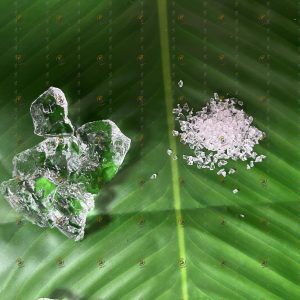Potassium polyacrylate is a superabsorbent polymer widely used in agriculture to enhance soil water retention. It’s important to understand its environmental impact, origin, and safety. This article addresses common concerns related to potassium polyacrylate.

Ist Kaliumpolyacrylat Schädlich für die Umwelt?
Potassium polyacrylate itself is not inherently harmful to the environment, but its environmental impact depends on usage and disposal practices.
- Degradation: Potassium polyacrylate is not biodegradable, meaning it does not break down quickly in the environment. It can take many years to degrade through natural processes such as exposure to sunlight and environmental conditions.
- Water and Soil Contamination: Incorrect disposal can lead to pollution of water bodies and soil. While it is non-toxic, excessive amounts can disrupt ecosystems and soil balance.
- Proper Disposal: To minimize environmental impact, it’s crucial to follow proper disposal and recycling protocols. Products containing potassium polyacrylate should be disposed of in accordance with local regulations.
Is Potassium Polyacrylate Natural?
Potassium polyacrylate is a synthetic polymer, created through industrial chemical processes.
- Composition: It is made up of long chains of acrylate compounds derived from petroleum-based sources.
- Production: The polymer is produced through polymerization, a chemical reaction that connects acrylate monomers into large, repeating chains, endowing it with its superabsorbent properties.
Is Potassium Polyacrylate Safe?
Potassium polyacrylate is generally considered safe for various uses, though some precautions are necessary.
- Non-Toxicity: It is non-toxic and does not pose significant health risks when used appropriately, making it suitable for agricultural applications.
- Inhalation and Skin Contact: Direct skin contact is typically safe, but inhaling its powdered form can irritate the respiratory system. Prolonged exposure to large amounts may cause skin irritation.
- Food Safety: Potassium polyacrylate is not approved for use in food products due to potential health risks if ingested.
Is Potassium Polyacrylate Safe for Plants?
Potassium polyacrylate is beneficial for plants, especially in improving soil water retention, but it must be used correctly.
- Water Retention: It significantly enhances soil’s ability to retain water, making it valuable in agriculture and horticulture, particularly in dry areas. This helps maintain soil moisture, promoting healthy plant growth and reducing irrigation needs.
- Soil Health: By keeping the soil moist for longer periods, potassium polyacrylate supports plant root development and overall health.
- Proper Use: Overuse can lead to waterlogged soil, which may impede airflow and harm plant roots. It’s important to use the appropriate amount to avoid such issues and optimize plant growth.
Schlussfolgerung
Potassium polyacrylate is a versatile polymer that offers significant benefits in agricultural applications due to its water retention properties. Although it is safe and non-toxic when used correctly, its synthetic nature means it is not biodegradable and requires responsible handling and disposal. By adhering to proper disposal methods and recommended usage guidelines, potassium polyacrylate can effectively support plant growth without causing environmental harm.
Understanding these factors helps ensure that potassium polyacrylate is used responsibly, benefiting both the environment and human health. For safe disposal methods, consult with local waste management services.

